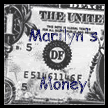With me back at work and Shane getting a pay raise, we decided it was time to revamp our budget a little.
We try to review it and make small adjustments every six months or so. Since we track all of our spending in Budget for Windows, it's easy to go back and see how much we have been spending in each budget category and decide whether adjustments need to be made.
This time around, our numbers were still on track. The dilemma comes into play when we try to decide where to allot the extra money*. A portion of my income will go into our current budget to loosen it up just a little. But what about the rest?
- Do we pay down/pay off our small debts (Visa and Sam's Club totaling about $2K)?
- Do we put everything we can into savings as a hedge against the second half of the year when I won't be working full-time?
- Do we pay any extra toward the principal of our van loan?
- How much can we earmark from each check for home improvements?
- How much cash out-of-pocket will we need, if any, to refinance our home when the ARM resets in July?
These are difficult decisions and we don't want to develop a case of "analysis paralysis" because we can't decide on the best route to take. So, we've decided that paying a little extra toward our small debts and socking the rest away in savings is what we'll do until we know more about both our tax return and the home re-fi. Then we can reassess and readjust.
Just curious...how would you approach things if you were in a similar situation?
*Extra money? Hahahaha. We have debt. There is no such thing as "extra" money.


















6 comments:
They always say pay off your debts first.
Of course, it's "do as I say, not as I do" when it comes to my financial history. :)
I also would have said pay the debts first...BUT...If you have a loan reset coming up...ooooh...I say, put it up in savings untill you're clear of the reset. Not needed? Then, pay off the smaller debt....
Yeah, I'd check the reset before doing anything - keep it in savings until then. After that, I'd pay down the highest interest rate card/loans, and go from there.
I would never never ever get an ARM. Never. Ever. They made 30yr fixed mortgages for a reason. We did a 20 yr fixed on ours, but I'm going to look into a re-fi to a lower rate in a month or two. We have a pretty high rate, so I may be able to shorten the mortgage even more for the same payment.
I would save some for the re-fi, just in case, and but pay extra on the debts. Paying just a bit mroe interest on a car loan can shave a few payments off the end, which is always nice.
"extra money". LOL. Never seems to happen...
Right on about the ARM. Go for a fixed rate: it's now possible to get a 30-year for under 6% with no points. SHOP AROUND!
How's your Emergency Fund? You know the Dave Ramsay drill...
You're doing everything right' just hang in there!
Hugs!
I agree with the idea of holding on to whatever we can until we find out about the reset. At this point I know we DO qualify for a better interest rate on a fixed-rate mortgate, but the problem is the fees we'd incur by refinancing before the initial term is up (for us that means we'd have fees if we re-fi before our July 1 payment.)
Although we obviously agreed to the ARM, we didn't seek it out. In fact, we had walked away from buying our home once. We didn't qualify for the FHA loan we wanted because of past credit problems.
But because four more home sales hinged on our sale closing first (in a chain reaction fashion) a lot of work was done to find a mortgage we did qualify for, which was the ARM. And because we liked the house and knew it was somewhat under-priced for strictly cosmetic reasons, we agreed. I'm sure we wouldn't do that again, though.
Post a Comment